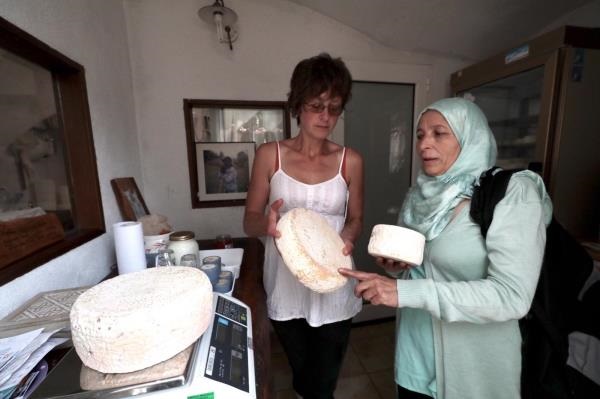
27 August 2019, Rome/Damascus - Slow Food and the Food and Agriculture Organization of the United Nations (FAO) are organizing a study tour this week in northwest Italy for a group of Syrian small-scale women farmers.
The two organizations have teamed up to enhance the skills of small-scale women food producers from Syria - all with the aim of supporting crisis-affected communities to regain or boost their livelihoods, and reviving the country's agriculture sector.
Seven Syrian women will learn from farming communities in Piedmont and Liguria regions that produce and promote local, organic and artisan foods marked by high quality and respect for traditions.
They are expected to gain knowledge on all aspects of production, marketing and value chains of a range of products - including dairy, honey, oil, cereals, breads and vegetables - and to pass on this knowledge to other women farmers in their communities upon their return. They will also be included in the global Slow Food network of local farmers so that they can continue learning and sharing knowledge and experiences.
The Syrian women come from Homs, Hama, Lattakia, Tartous, Aleppo, Sweida and Al Qunatra governorates, and are each engaged in producing one type of local food - one product per each village - from dried figs to honey.
They either own a small plot of land (less than half hectare), growing food for their family's consumption and/or are engaged in activities such as making jams, pickles, tomato paste, cheese and other food products to support their families.
"We are honoured to accompany these Syrian farmers to visit our producers and Presidia," said Nazarena Lanza, Slow Food Area Coordinator.
The Slow Food Presidia projects help artisan food producers and farmers all over the world to safeguard their food and agricultural heritage. The Syrian women will meet farmers from six such Presidia projects focused on producing: butter of high Elvo Valley, extra-virgin olive oil, high mountain honey, Robiola (cheese) di Roccaverano, Sambucano lamb and Vessalico garlic.
"We would like to build on this partnership and organize other workshops to improve the production of foods in semi-arid areas by using agro-ecological practices. Years of conflict, climate change, and decades of monocultures have led to serious declines in biodiversity and the loss of expertise to engage in sustainable agriculture," added Lanza.
"We hope this study tour will help Syrian women learn both technical and entrepreneurial skills, and gradually turn their products from home-made to artisanal, which also means selling them to wider markets," said Patrizia Epifania, Programme Officer with FAO Syria who is accompanying the Syrian women on the tour.
"This initiative is part of FAO's wider efforts to boost the country's agriculture and improve food security for a population that has been through a lot, and is determined to pick up the pieces and get back on their feet," said Mike Robson, FAO Representative in Syria.
Why focus on women farmers in Syria
Eight years of crisis have damaged Syria's agriculture and created an unbalanced labour force. In many cases, women have become sole breadwinners and have turned to agriculture - often the only means to earn an income and support their families.
Prior to the conflict, agriculture was a male-dominated field, which means that women are faced now with several challenges.
They often lack knowledge of market requirements, have limited farming skills and experience in producing and marketing their foods, and lack access to information about funding and training opportunities.
"We are using primitive equipment that we have had since we were young. We want to grow our business by using modern equipment for packaging as well as moisture and acidity measurements so we can make products that meet global standards. Our figs have high nutritional value, and are 100 percent natural and rain-fed," said mother of five Afaf Jafaar who grows and dries figs - the only fruit available in her village - and is one of the Syrian women on the study tour in Italy.
Aicha Dalati, a beekeeper from Aleppo city who had to flee because of the conflict after losing all her hives, has restarted her life and livelihood in a nearby village and is also part of the study tour. She says she is limited to selling her honey locally.
"Transportation is a challenge. Also the fact that I don't get to see a profit immediately as I receive the payments in installments. If I can sell my products properly, my life will be better," said Aicha.
"I want to learn from the Italian farmers and see how I can develop my business," she added.
More about FAO and Slow Food's work in Syria
FAO is supporting Syrian rural women producers and their communities to become more self-resilient by enhancing their capacity in food production and entrepreneurial skills. FAO provides them with good quality inputs (such as seeds and fertilisers), training on sustainable agriculture and marketing; sets up irrigation systems; and creates and strengthens women producers' and water users' groups, reinforcing women's roles at a time when they are shouldering a lot of responsibilities.
Slow Food is a global network of local communities founded in 1989 to prevent the disappearance of local food cultures and traditions and counteract the rise of fast food culture. Since its founding, Slow Food has grown into a global movement involving millions of people in over 160 countries, working to ensure that everyone has access to good, clean and fair food. In Syria, Slow Food set up a Slow Food convivium (local chapter) and ten school gardens and aims to build a wider Slow Food network in the Arab region.